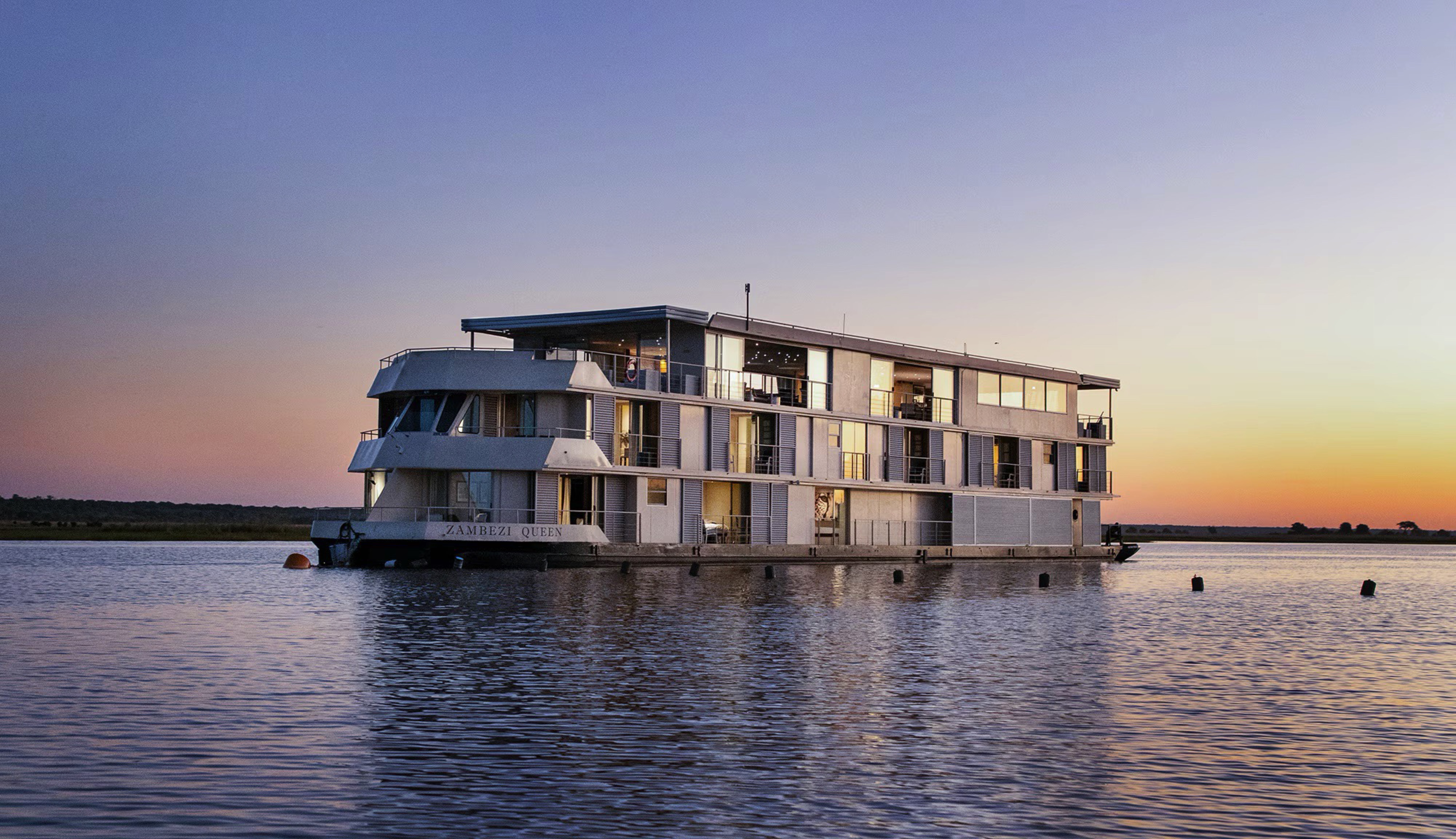Itinerary
Sometimes referred to as the Mother City, Cape Town is the most famous port in South Africa and is influenced by many different cultures, including Dutch, British and Malay. The port was founded in 1652 by Dutch explorer Jan Van Riebeeck, and evidence of Dutch colonial rule remains throughout the region. The port is located on one of the world’s most important trade routes, and is mainly a container port and handler of fresh fruit. Fishing is another vital industry, with large Asian fishing fleets using Cape Town as a logistical repair base for much of the year. The region is famous for its natural beauty, with the imposing Table Mountain and Lions Head, as well as the many nature reserves and botanical gardens such as Kirstenbosch which boasts an extensive range of indigenous plant life, including proteas and ferns. Cape Town’s weather is mercurial, and can change from beautiful sunshine to dramatic thunderstorms within a short period. A local adage is that in Cape Town you can experience four seasons in one day.
Day programme:
ARRIVE IN CAPE TOWN, SOUTH AFRICA. Situated amidst majestic mountains and lined withpristine beaches, Cape Town has a rich cultural heritage with extraordinary attractions. After being greeted at theairport by an AmaWaterways representative, transfer to your historic hotel with its lush gardens and Table Mountainas a backdrop. Get to know your tour director and fellow travelers at a special Welcome Reception. (WR)
Sometimes referred to as the Mother City, Cape Town is the most famous port in South Africa and is influenced by many different cultures, including Dutch, British and Malay. The port was founded in 1652 by Dutch explorer Jan Van Riebeeck, and evidence of Dutch colonial rule remains throughout the region. The port is located on one of the world’s most important trade routes, and is mainly a container port and handler of fresh fruit. Fishing is another vital industry, with large Asian fishing fleets using Cape Town as a logistical repair base for much of the year. The region is famous for its natural beauty, with the imposing Table Mountain and Lions Head, as well as the many nature reserves and botanical gardens such as Kirstenbosch which boasts an extensive range of indigenous plant life, including proteas and ferns. Cape Town’s weather is mercurial, and can change from beautiful sunshine to dramatic thunderstorms within a short period. A local adage is that in Cape Town you can experience four seasons in one day.
Day programme:
CAPE TOWN. Begin the day by taking the cableway up Table Mountain, which offers sweeping views ofthe landscapes below. Afterward, enjoy one of the world’s most stunning drives as you head southeast along theAtlantic seaboard past the 12 Apostles, Hout Bay and Chapman’s Peak. Stop at the Cape of Good Hope and itslighthouse, a historic landmark and crucial waypoint for European explorers after it was first discovered in 1488.After a local lunch, you’ll also visit Boulders Beach, home to thousands of African penguins. Back in Cape Town,the evening may be spent at your leisure. (B,L)
Sometimes referred to as the Mother City, Cape Town is the most famous port in South Africa and is influenced by many different cultures, including Dutch, British and Malay. The port was founded in 1652 by Dutch explorer Jan Van Riebeeck, and evidence of Dutch colonial rule remains throughout the region. The port is located on one of the world’s most important trade routes, and is mainly a container port and handler of fresh fruit. Fishing is another vital industry, with large Asian fishing fleets using Cape Town as a logistical repair base for much of the year. The region is famous for its natural beauty, with the imposing Table Mountain and Lions Head, as well as the many nature reserves and botanical gardens such as Kirstenbosch which boasts an extensive range of indigenous plant life, including proteas and ferns. Cape Town’s weather is mercurial, and can change from beautiful sunshine to dramatic thunderstorms within a short period. A local adage is that in Cape Town you can experience four seasons in one day.
Sometimes referred to as the Mother City, Cape Town is the most famous port in South Africa and is influenced by many different cultures, including Dutch, British and Malay. The port was founded in 1652 by Dutch explorer Jan Van Riebeeck, and evidence of Dutch colonial rule remains throughout the region. The port is located on one of the world’s most important trade routes, and is mainly a container port and handler of fresh fruit. Fishing is another vital industry, with large Asian fishing fleets using Cape Town as a logistical repair base for much of the year. The region is famous for its natural beauty, with the imposing Table Mountain and Lions Head, as well as the many nature reserves and botanical gardens such as Kirstenbosch which boasts an extensive range of indigenous plant life, including proteas and ferns. Cape Town’s weather is mercurial, and can change from beautiful sunshine to dramatic thunderstorms within a short period. A local adage is that in Cape Town you can experience four seasons in one day.
Day programme:
CAPE TOWN. Today, you may visit Robben Island, once used as a prison for many political inmates,including Nelson Mandela. You’ll ferry over to the island, where a warden will lead you through the prison andrecount its tumultuous history. Back in Cape Town, enjoy lunch and visit a nearby township where you’ll have aunique and memorable experience meeting residents involved in the arts (music and theater), market gardens, andother community projects, as well as learning about the day-to-day life of the locals. In the evening, enjoy a specialwine tasting and gourmet dinner at a vineyard in the nearby winegrowing region of the Constantia Valley. (B,L,D)
Sometimes referred to as the Mother City, Cape Town is the most famous port in South Africa and is influenced by many different cultures, including Dutch, British and Malay. The port was founded in 1652 by Dutch explorer Jan Van Riebeeck, and evidence of Dutch colonial rule remains throughout the region. The port is located on one of the world’s most important trade routes, and is mainly a container port and handler of fresh fruit. Fishing is another vital industry, with large Asian fishing fleets using Cape Town as a logistical repair base for much of the year. The region is famous for its natural beauty, with the imposing Table Mountain and Lions Head, as well as the many nature reserves and botanical gardens such as Kirstenbosch which boasts an extensive range of indigenous plant life, including proteas and ferns. Cape Town’s weather is mercurial, and can change from beautiful sunshine to dramatic thunderstorms within a short period. A local adage is that in Cape Town you can experience four seasons in one day.
Day programme:
CAPE TOWN – VICTORIA FALLS, ZIMBABWE – ZAMBEZI QUEEN – EMBARKATION. Inthe morning, transfer to the airport for a flight to Victoria Falls. Here, you will be transferred to the Chobe Riverthat forms the border between Botswana and Namibia. Tender boats will transport you to Zambezi Queen, mooredon the Namibia side of the river. Settle into your stateroom, enjoy a mid-afternoon snack, and in the evening, betreated to a Welcome Cocktail Reception and Dinner. (B,D)
Day programme:
ZAMBEZI QUEEN. Embark on a morning boat safari and experience the Chobe River’s diverse gameviewing. Afterwards, return to Zambezi Queen for lunch. As the ship cruises along the Chobe River, you can spendtime in the splash pool, visit the spa or perhaps catch up with your favorite book. Later in the day, revel in thepanoramic views with another boat safari opportunity. (B,L,D)
Day programme:
ZAMBEZI QUEEN. Start your day off with a boat safari. Later, a local African village invites you toexperience the local culture firsthand. Spend time with the children of the village as well as its elders and learnabout their day-to-day life. After lunch on board, you can choose between a boat safari, bird watching or fishing.Spend your last evening aboard reveling in a festive African-themed dinner hosted by your crew—complete withsinging and dancing. (B,L,D)
Day programme:
ZAMBEZI QUEEN – DISEMBARKATION – VICTORIA FALLS, ZIMBABWE. Disembark andjoin a wildlife safari of Chobe National Park in open-top 4×4 vehicles. Be on the lookout for elephants, giraffes,zebras, sable, warthogs and cape buffaloes. Prides of lions, hyenas and (more rarely) cheetahs may also appearalong the way. For lunch, take a seat under the trees and savor a delicious picnic. Later this afternoon, transfer toVictoria Falls, then enjoy a special dinner with live local entertainment at your hotel. (B,L,D)
Day programme:
VICTORIA FALLS. Join a local guide for a tour of Victoria Falls. Learn about its history as well as theflora and fauna that make this area so unique. In the evening, embark on a private sunset cruise along the ZambeziRiver. Relax on board as you observe a variety of wildlife while enjoying a delicious mix of tapas with drinks. (B)
Day programme:
VICTORIA FALLS. This morning, you are invited on a leisurely guided walk across the Victoria FallsBridge, which connects the countries of Zimbabwe and Zambia. Once in Zambia, explore the more intimate side ofthe Falls and visit the historic town of Livingstone. Later, head back to Zimbabwe for a free afternoon. As a specialtreat tonight, head out on a safari to seek out the elusive Black Rhino and other nocturnal animals, followed by athree-course bush dinner. (B,D)
Day programme:
VICTORIA FALLS – JOHANNESBURG, SOUTH AFRICA. Board your flight to Johannesburg,where you will be met by your AmaWaterways local guide, then transfer to the Fairlawns Boutique Hotel with itsparklike setting and wonderful spa. (B)
Day programme:
JOHANNESBURG. Get an in-depth look at Soweto’s unique neighborhoods, which served as the centerof the uprising against the apartheid state. Walk in the footsteps of Nelson Mandela and visit a youth center andschool in the heart of Kliptown, one of Soweto’s neighborhoods. After a local lunch, tour the Apartheid Museum,which chronicles the history of apartheid in South Africa and the struggle of citizens to end the regime of racialsegregation. Later, return to your hotel and enjoy free time, where you may visit the hotel’s renowned spa or take aswim in the pool. In the evening, you are invited to join a multi-course dinner. (B,L,D)
Day programme:
JOHANNESBURG – KRUGER NATIONAL PARK AREA. Board your flight to Greater KrugerNational Park in the morning, where you’ll be transferred to the five-star Tented Camp. During the afternoon, setout on a game drive in search of the country’s “Big Five” and other native wildlife. Spend your first night and everynight, if you wish, gathering with fellow travelers, sharing stories of the day’s adventures. (B,L,D)
Day programme:
KRUGER NATIONAL PARK AREA. Early morning is the perfect time to go on safari, as thewildlife is prolific. Your open-air vehicle provides the ideal way to explore your private game reserve, located justa stone’s throw from the game-rich Kruger National Park. The rest of each morning and early afternoon can bespent enjoying the facilities and participating in various activities at a luxury tented safari lodge. Later, eachafternoon, you will go on another game drive deep into the bush, where you may encounter South Africa’s toppredators: cheetahs, hyenas and lions. (B,L,D)
Day programme:
KRUGER NATIONAL PARK AREA. Early morning is the perfect time to go on safari, as thewildlife is prolific. Your open-air vehicle provides the ideal way to explore your private game reserve, located justa stone’s throw from the game-rich Kruger National Park. The rest of each morning and early afternoon can bespent enjoying the facilities and participating in various activities at a luxury tented safari lodge. Later, eachafternoon, you will go on another game drive deep into the bush, where you may encounter South Africa’s toppredators: cheetahs, hyenas and lions. (B,L,D)
Day programme:
KRUGER NATIONAL PARK AREA – JOHANNESBURG. Join one last early-morning game drivebefore returning to the lodge for breakfast. Afterwards, transfer to the airport in Johannesburg for your connectingflight home. (B)Note: Please do not schedule your onward flight before 5:00 p.m
Ship features
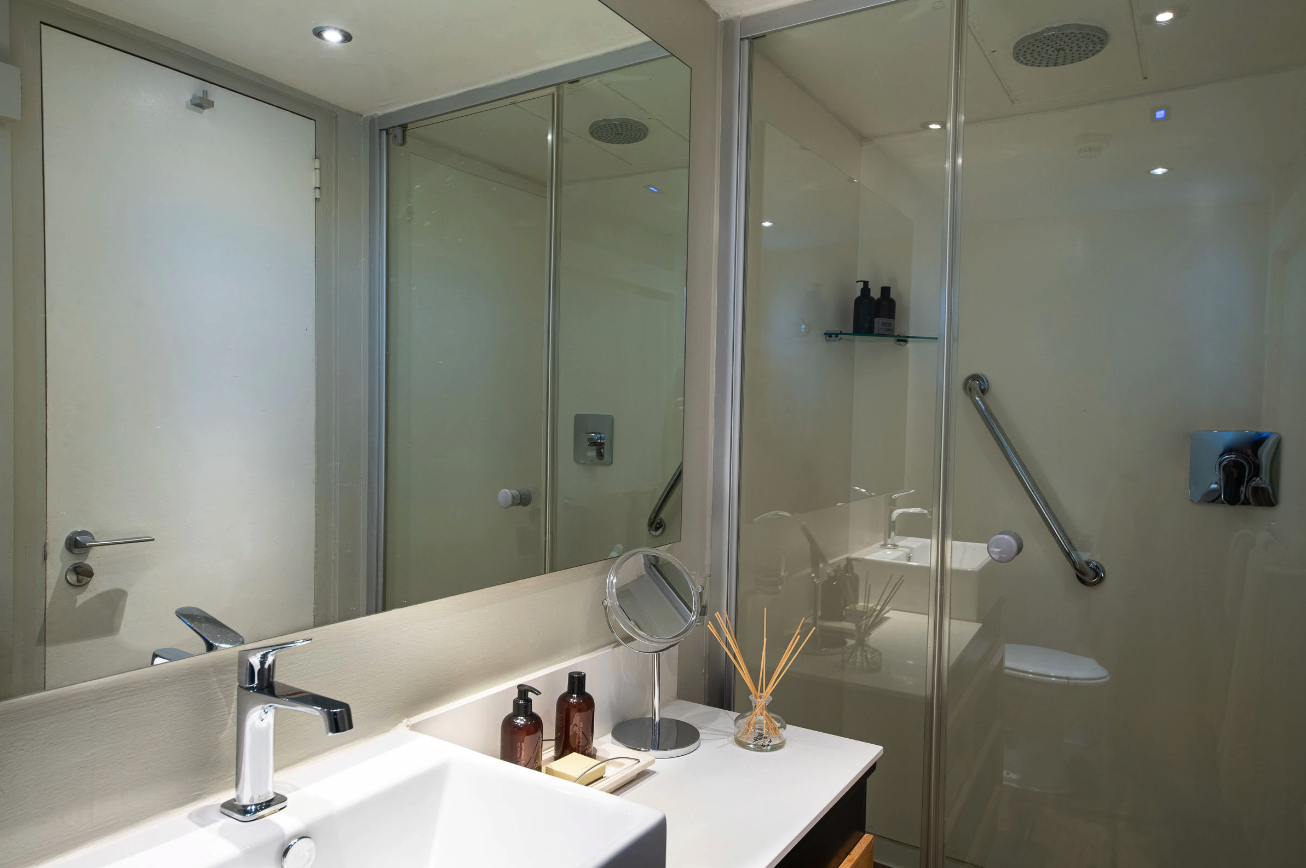
Luxury Suite
Suite Features
- In-room temperature control and fan
- Spacious en-suite bathrooms
- Large wardrobe, full-length mirror, hair dryer, toiletries, bathrobes and slippers
- Floor-to-ceiling windows, sliding glass doors and sliding shutters for privacy and protection from the sun
- Outside balcony
- Complimentary Wi-Fi and electronic safe
- Complimentary bottled water replenished daily
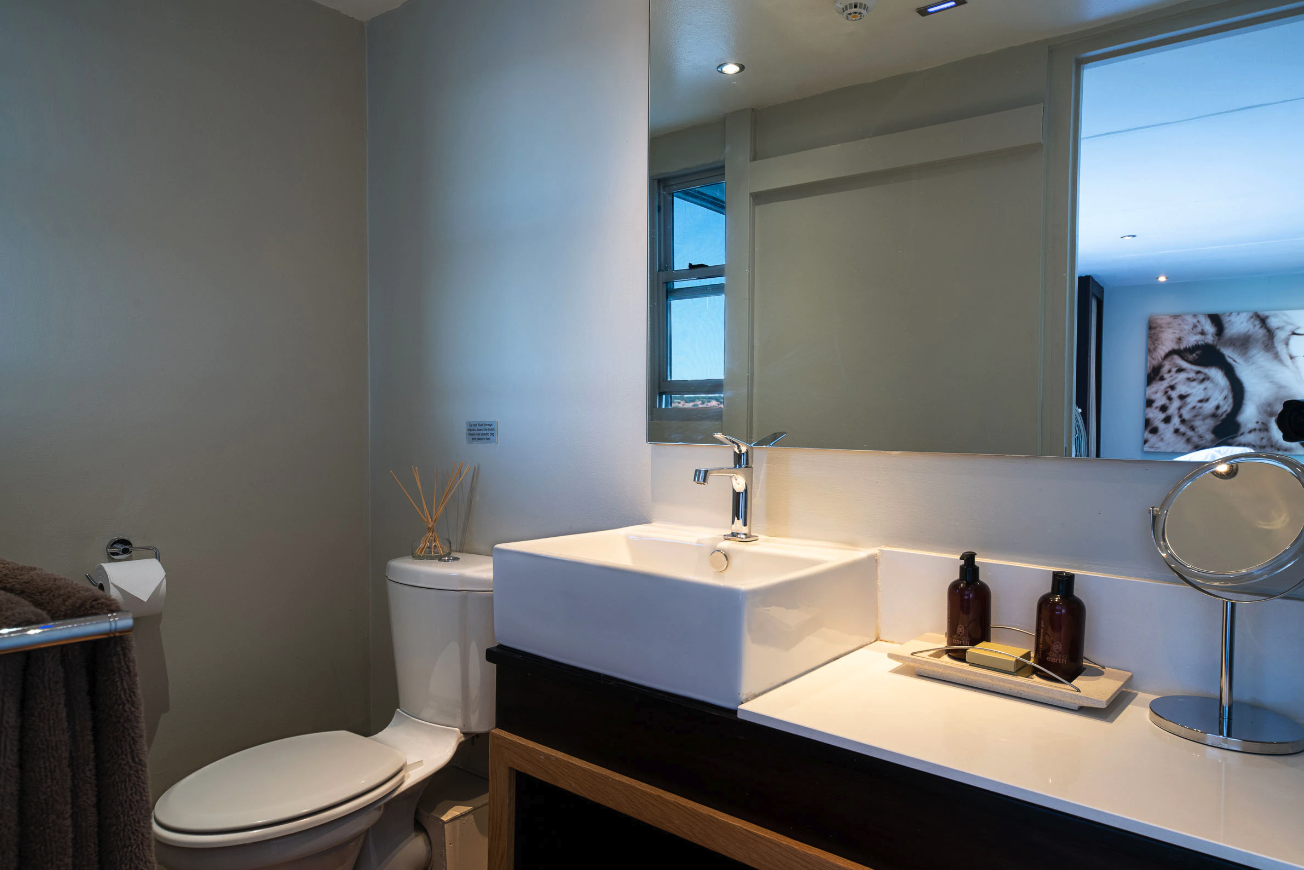
Category SA
Stateroom Features
- In-room temperature control and fan
- Deluxe hotel-style bedding and oversized king beds (can also be configured as two single beds)
- Spacious en-suite bathrooms
- Large wardrobe, full-length mirror, hair dryer, toiletries, bathrobes and slippers
- Floor-to-ceiling windows, sliding glass doors and sliding shutters for privacy and protection from the sun
- Outside balcony
- Complimentary Wi-Fi and electronic safe
- Complimentary bottled water replenished daily
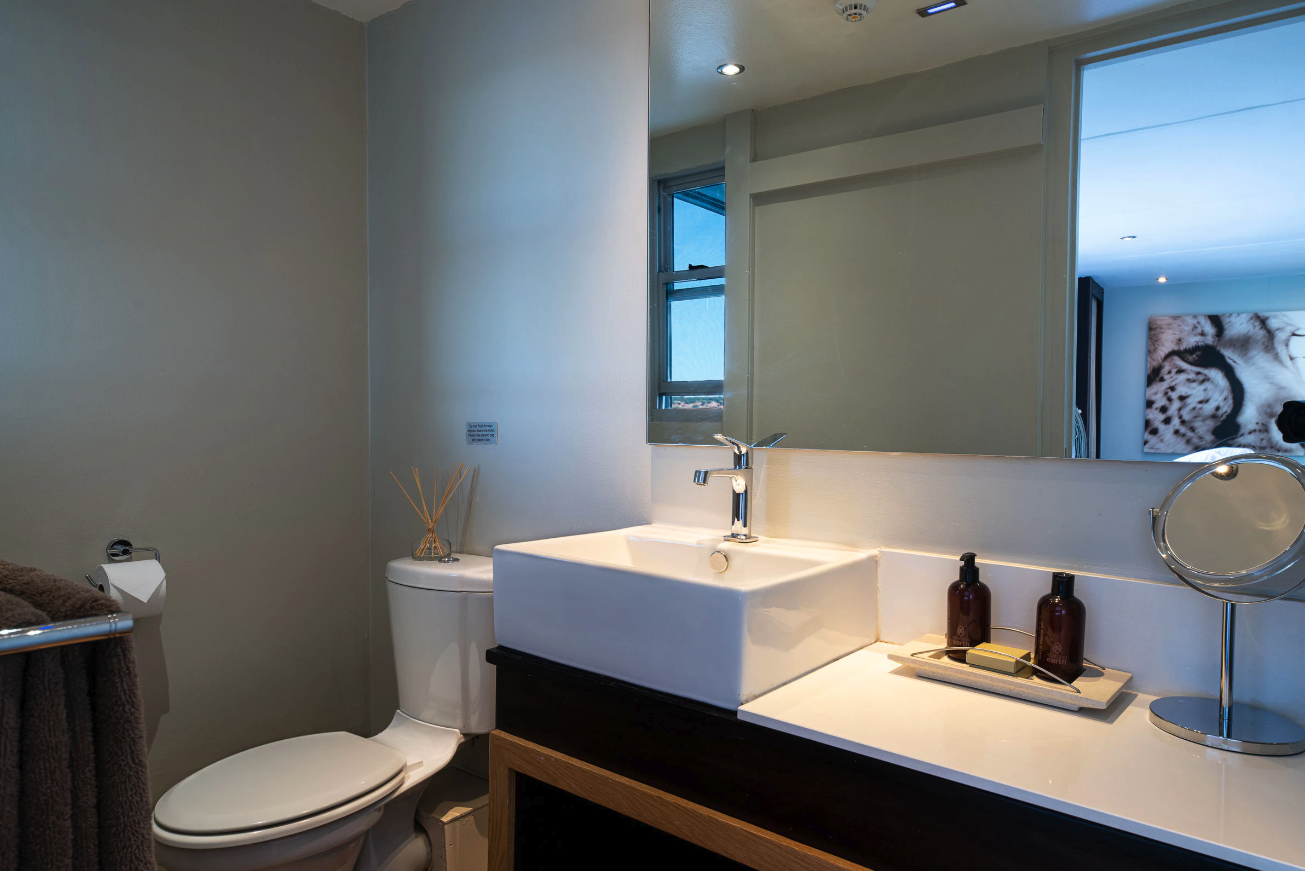
Category SB
Stateroom features include:
- In-room temperature control and fan
- Deluxe hotel-style bedding and oversized king beds (can also be configured as two single beds)
- Spacious en-suite bathrooms
- Large wardrobe, full-length mirror, hair dryer, toiletries, bathrobes and slippers
- Floor-to-ceiling windows, sliding glass doors and sliding shutters for privacy and protection from the sun
- Outside balcony
- Complimentary Wi-Fi and electronic safe
- Complimentary bottled water replenished daily
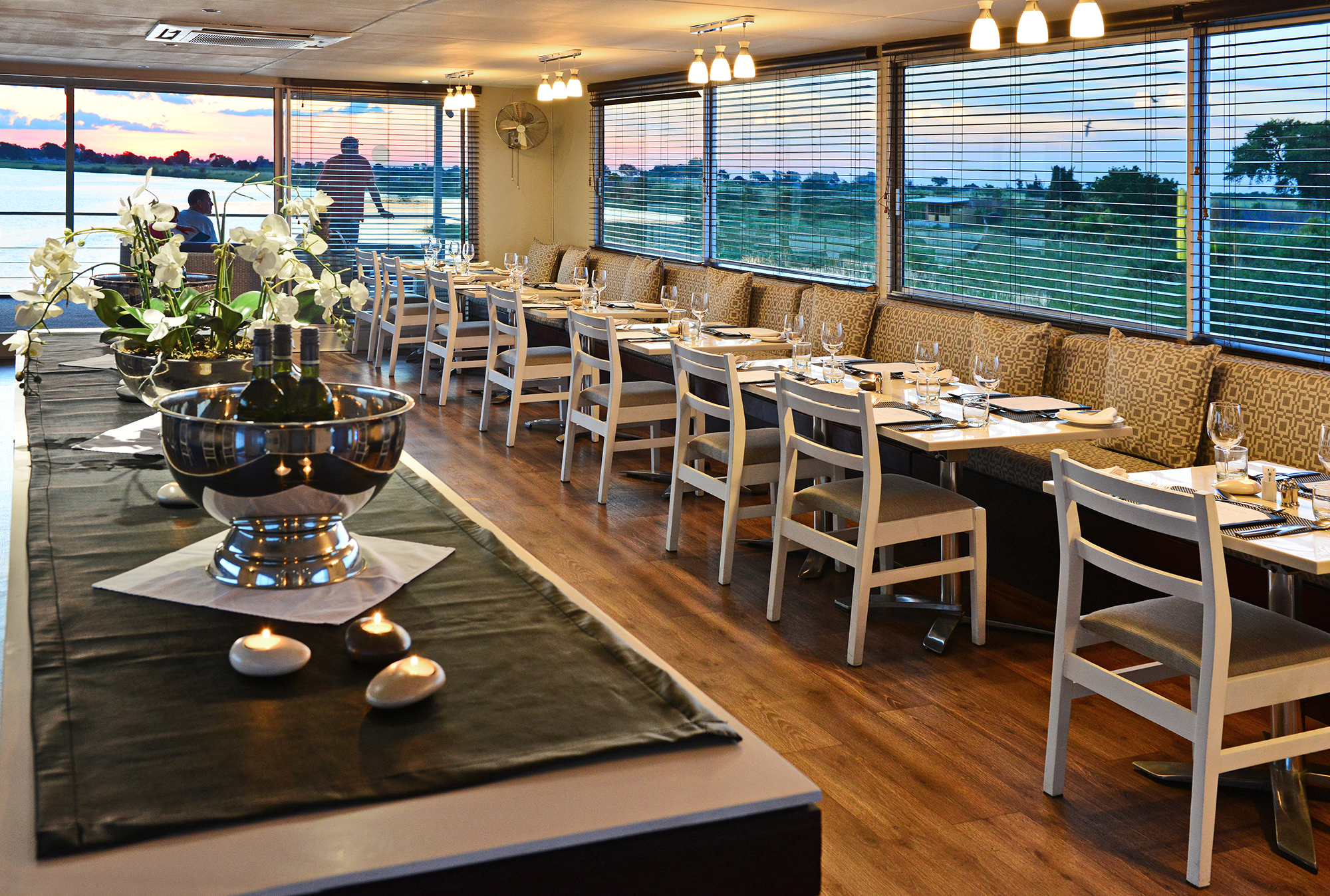
Main Restaurant
Situated on the 3rd level, the dining room offers unobstructed views on three sides. Experience delectable dishes such as butternut and macadamia soup and fillet of beef with bordelaise sauce paired with the perfect wine.
Restaurant Features:
- All meals included during the cruise with complimentary wine and beer
- Enjoy delicious cuisine while observing the surrounding wildlife
Wildlife
The mighty roar of the lion, the powerful call of the elephant, the thunderous clap of a rhinoceros herd – Africa’s incredible national parks are most certainly “where the wild things are.”
Tarangire National Park
Tarangire boasts a variety of wildlife as diverse as its landscape. This picturesque destination is home to all of Tanzania’s most iconic animals, including wildebeest, zebra, gazelle and giraffes.
Lake Manyara National Park
Lake Manyara National Park is one of Africa’s alkaline water lakes, which attracts a vast population of water birds and a wide range of animals. The park is famous for its tree-climbing lions.
Ngorongoro Conservation Area
Often called “Africa’s Eden,” Ngorongoro Crater is the largest intact caldera in the world. An estimated 25,000 large mammals roam through this lush paradise.
Serengeti National Park
The UNESCO-designated Serengeti spans 12,000 square miles and teems with the most magnificent wildlife, offering exciting and unrivaled game-viewing.
Kruger-National-Park
One of Africa’s largest reserves, Kruger stretches through 7,500 square miles in northeastern South Africa, and borders Zimbabwe and Mozambique. With over 270 animal species, there is much to see and experience.
Lodges & Hotels
Experience uninterrupted game viewing in an untouched African wilderness and wake up to the sounds of the wild during your stay at one of two lodges, each designed for an unforgettable adventure.
Tintswalo Safari Lodge
Set amidst ancient sycamore trees and nestled along a seasonal river, this luxurious lodge boasts six classic suites (725 sq. ft.). You’ll find both an indoor and outdoor shower, and the deck features a private plunge pool.
Serengeti Migration Camp
The 20 deluxe and spacious elevated tents at Serengeti Migration Camp feature 360-degree verandah decks, creating your very own private sanctuary. This camp has been named one of the world’s “Top 10 Hotels” by “Travel + Leisure.”
Serengeti Pioneer Camp
This wondrous 5-star camp, modeled after the safari retreats of the 1930s, provides an ideal location in a unique area that takes advantage of the early months of the annual migration. The camp comprises ten individually designed luxury tents, complete with en-suite facilities.
Tarangire Treetops
Live a dream staying high above marula and baobab trees at one of the world’s most distinctive lodges. Each elevated, open-fronted room offers panoramic views across the Tarangire plains and boasts large bedrooms and exotic double showers.
The Manor at Ngorongoro
Each of the 20 Manor Cottage suites at this gracious estate features a private deck and courtyard, indoor and outdoor fireplaces, a Victorian-style claw-footed bath and a rainfall shower.
Authentic Experiences
National Park Safaris
From massive herds of impala to lounging lions, the diversity of this region sets it apart from any other location in the world and allows for exhilarating encounters with the mighty animal kingdom.
Bird Watching and Fishing
Hook a tiger fish, or one of the many bream species. Prefer bird watching? Since the Chobe River is home to more than 450 species, you’ll be able to spot a host of birds.
Gorilla Trekking in Rwanda
Discover Rwanda’s natural wonders and wildlife on an epic adventure with the magnificent Mountain Gorillas, a truly once-in-a-lifetime experience to see the gorillas in the mist.
African Village Visit
During your cruise along the Chobe River, you will visit one of the villages along its banks and meet the wonderful residents there. Many guests wish to give back after visiting the village. If you’d like to coordinate a donation to any African village, please contact us at giveback@amawaterways.com.
Boma Dinner
BOMA (British Officers Mess Area) is a circular-shaped gathering point, normally with a fire pit, where people gather to cook, eat, sing and socialize.
Rovos Rail
When wood-paneled coaches and world-class staff greeted adventurers ready to be whisked off on the safari of their dreams…
Wishing you could harken back to this golden age of African rail safari? Where you could roll through the countryside aboard a locomotive, taking in the impressive wildlife and rugged landscape of Africa? Don’t let this bygone era pass you by! You too can enjoy the romantic and nostalgic atmosphere for yourself as you board a luxurious Rovos Rail vintage train and travel through the heart of some of Africa’s most vividly captivating sights on our Rivers & Rails of Africa itinerary.
The Distinguished Way to Travel
Traveling via train was once the most distinguished way to travel. It was glamorous, chic, and posh. Trains were dazzling works of art and the subjects of Agatha Christie novels. Travelers would dress in their absolute finest and delight in the utter luxury of taking one’s time—after all, life is about more than just the destination.
Since its establishment in 1989, Rovos Rail has earned an international reputation for its truly world-class travel experiences. Five-star cuisine, excellent South African wines, and extraordinary views await our explorers when traveling in turn-of-the twentieth-century style throughout this 995-mile route.
Safari in Luxury
Your trip aboard Rovos Rail will start with a sendoff at the colonial-era rail station in Victoria Falls. From there, wind your way through the timeless beauty of the African bush – where you may spot various herds of wildlife roaming or galloping by. As you travel to your next destination, you can relax in the train’s glamorous lounges, which feature plush seating and picture windows. You will also enjoy your meals in the exquisite Victorian dining room, where crisp linen and polished silver are paired with elegant cuisine and fine wines. Dressing up for dinner is all part of the fun here – with cocktail attire for ladies and jackets and ties for gentlemen.
Watching the World Go By
After your visit to Zimbabwe’s Hwange Game Reserve, you will continue towards the metropolitan city of Pretoria, where you will be met by lush mauve blossoms and Jacaranda trees lining streets – and possibly even a flock of preening peacocks that congregate nearby. Through it all, you’ll be able to watch the world roll by at the pace of a time gone by – but with some modern amenities and considerations, such as air-conditioned suites and lounges. There are no radios or television sets on board to preserve the authenticity of travel at the turn of the century, but travelers may use laptops or mobile devices within the privacy of their own suite.

Sought-After Souvenirs
What will you bring home from your Africa cruise? Below are two guest – and crew – favorites that support local artisans and villages.
Rooibos Tea
For the tea connoisseur, pick up some fresh rooibos tea, “red tea”, that can only grow in the Cederberg region of the Western Cape. It’s well-known for its antioxidant properties and had a mild, earthy flavor.
Zulu Shield
Take a piece of Africa home with you with a traditional Zulu shield (sizes range from small decorative to large life-size). With intricate beadwork, Zulu Shields are beautiful in both color and craftsmanship.
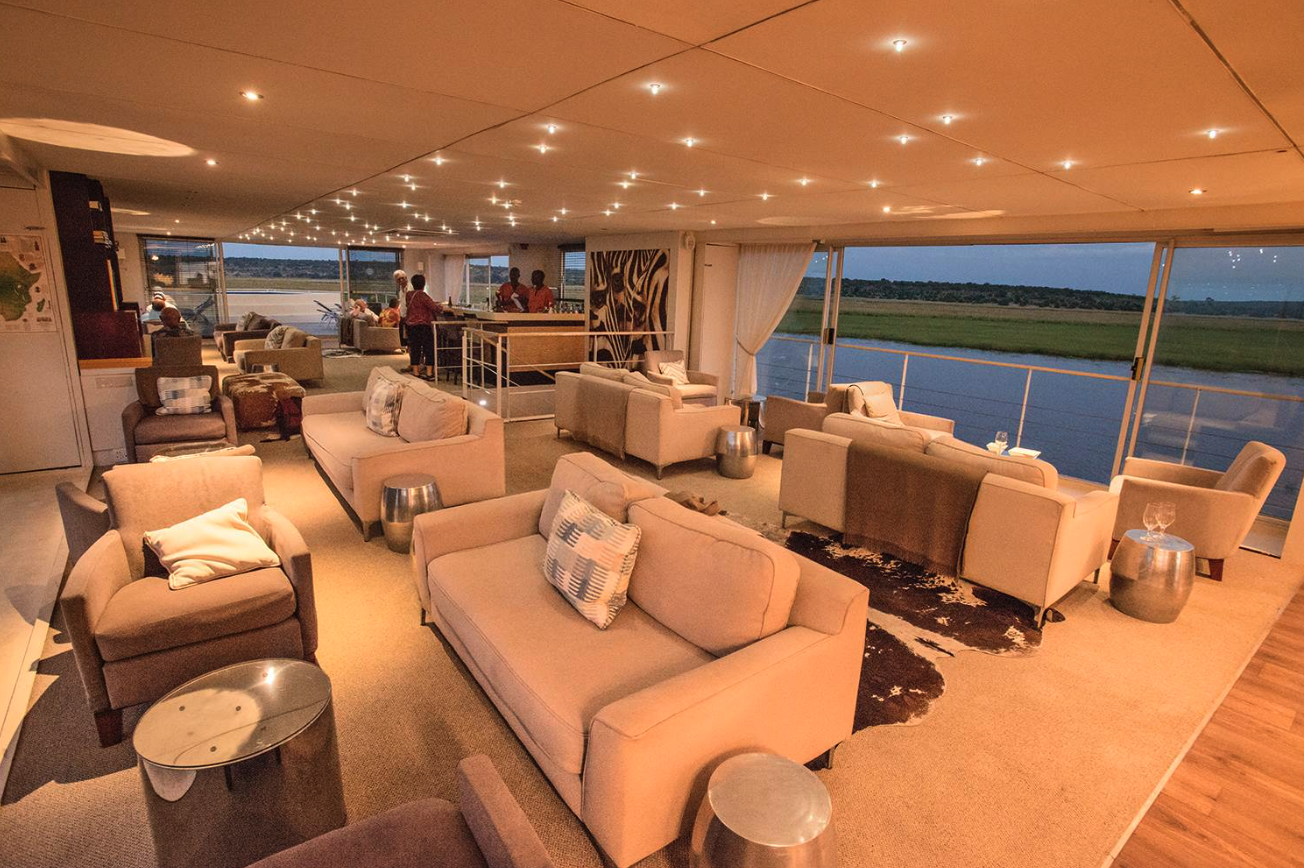
Lounge & Bar
With panoramic floor-to-ceiling windows throughout the boat, everywhere you go you can take advantage of magnificent wildlife viewing.
Bar includes local & imported spirits, wine and beers
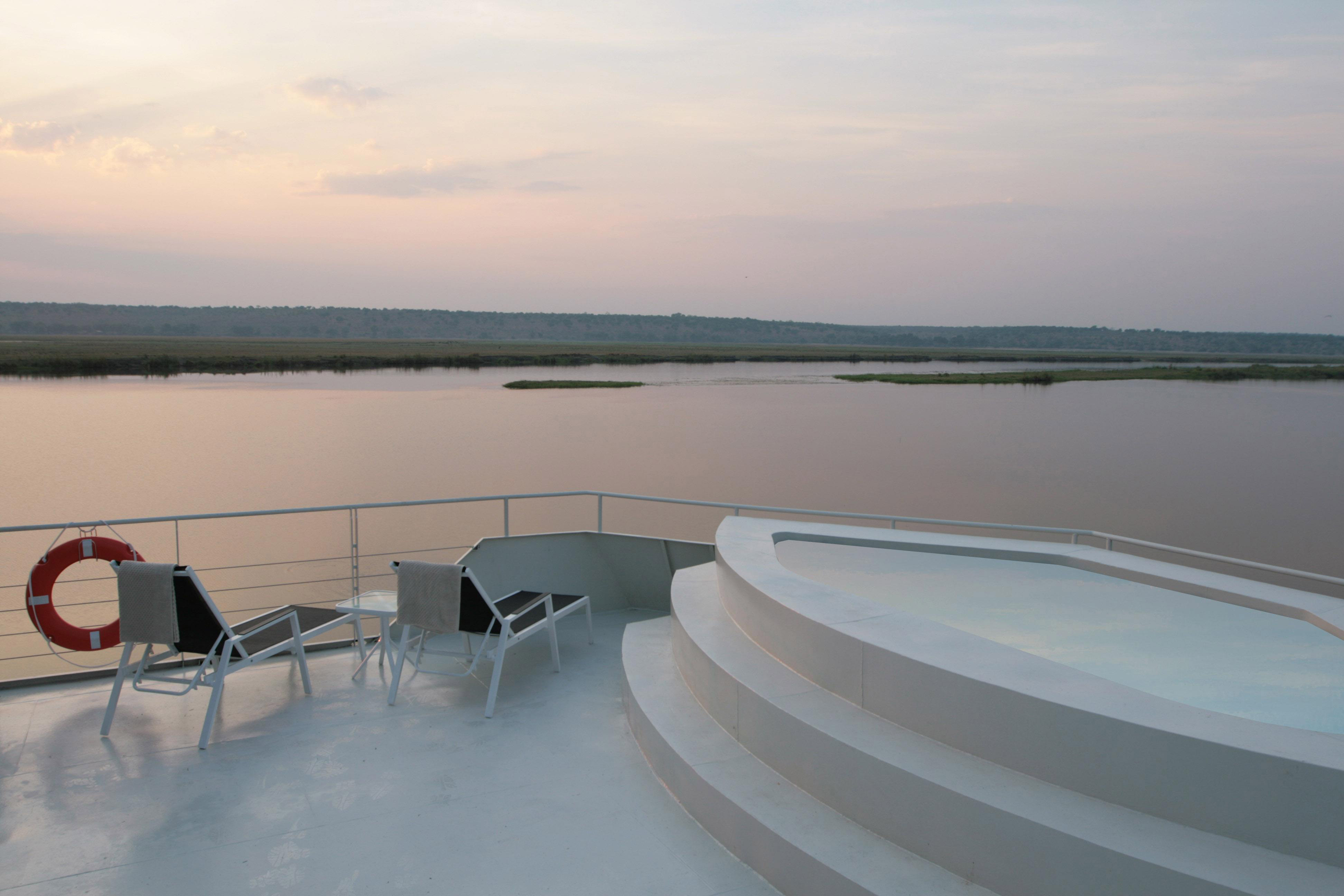
Pool Deck
The top deck features an open-air Sun Deck complete with a plunge pool. Unlike a typical river cruise that travels from one port to the next, the Zambezi Queen was designed for an entirely different purpose—to facilitate optimal game viewing along the Chobe.
Gift Shop
The onboard boutique offers a variety of souvenirs for purchase.
Local Entertainment
One of the most enriching ways to discover Africa is through its spirited dance, as well as its music, which varies throughout the continent. While cruising, be treated to an African-themed dinner, combining the traditional food, music and dance of the Chobe River region.

Plunge Pool
Take a cooling dip and feel refreshed while watching the passing scenery and wildlife upon the Chobe River.
Onboard Spa
Indulge in the ultimate in relaxation by pampering yourself with a variety of massage and facial treatments while cruising the Chobe River, available for a nominal fee.
Age Restriction
All guests under the age of 18 are to be in a stateroom with an adult and must remain supervised at all times; their safety is the responsibility of the accompanying adult(s). In the case where a triple or quad occupancy stateroom is not available or not selected, children under the age of 10 at the time of embarkation may share a stateroom with two adults only in circumstances where the child is able to share the bed with the adults – no additional bed will be provided. Please be aware that balcony staterooms of any kind may be unsafe for minors if left unsupervised. There is a minimum age limit of 4 years old, unless otherwise agreed upon by AmaWaterways.
On our Africa Safaris & Wildlife Cruise program, due to safety precautions, there is a minimum age limit of 12 years old, unless otherwise agreed upon by AmaWaterways.
AmaWaterways does not provide child-specific programs or child-minding facilities. Please reach out to us if you have any further questions regarding our child policy.
Dress Code
Comfortable, layered clothing adaptable to changing weather conditions is always advisable for daytime excursions. For the evening, “Casually elegant” attire is recommend and you may want to pack something a little dressier for the Captain’s night/Farewell Dinner – similar to how one would dress to dine at a 5-star restaurant. Comfortable shoes are recommended for excursions and workout clothing if you plan to take part in any wellness activities, active tours or use the onboard gym. Depending on the time of year, clothing that can be layered is highly recommended.
Smoking Policy
Smoking is forbidden on all internal areas on the Zambezi Queen. Smoking is only permitted on the outside area of the entertainment deck.
Dietary Requirements
Please let us know prior to your departure if you have any special dietary requirements (e.g. vegan, diabetic, gluten-free, etc.). We will make every effort to accommodate your requests, with the resources available to us.
Disabled Facilities
Physical Requirements
AmaWaterways’ itineraries are as varied and active as you want them to be. Shore excursions and land packages require a moderate-to-challenging amount of walking and sites may have steps and/or uneven terrain. The embarkation/disembarkation points between ship and shore may not be able to accommodate guests with mobility issues.
Due to uneven terrain, cobblestones, stairs, temples, dirt roads and a lack of accessible facilities, our itineraries are not recommended for guests with limited mobility requiring the use of mobility aids like wheelchairs, scooters or any other mechanical devices. We kindly request guests requiring special assistance be accompanied by a companion who is physically able to provide such assistance, as AmaWaterways crew is unable to assist guests with personal tasks or hygiene needs. If there is uncertainty of a prospective guest’s fitness to travel or ability to independently care for their personal needs, please inform AmaWaterways as soon as possible. This will allow us to consider and discuss possible accommodations to ensure your safety and comfort during the cruise.
Throughout your river cruise it is likely the ship will be docked next to one or two other river ships. It is important to note that in these cases, disembarkation/embarkation may include walking up the stairs and through the adjacent ship(s) lobby or Sun Deck to reach the shore. You may also need to embark or disembark via a narrow gangway or occasionally cross an uneven surface to enter or exit the ship. These are typical situations that are beyond the control of AmaWaterways.
Accessible Facilities
Due to lack of space and facilities, shipboard accommodations and storage for mobility aids like wheelchairs, scooters or any other mechanical devices are unavailable and accessible facilities are extremely limited in most destinations. In addition, motorcoaches, boats and minibuses used for transfers and shore excursions are not equipped with the devices and tools necessary for full accessibility.
Mobility Devices
Guests may bring personal mobility devices (wheelchairs, electric scooters and walking frames) onboard our ships. However, devices must be stored in the guest’s stateroom and cannot be used in the dining room or lounge and must adhere to local standards and limitations. AmaWaterways Cruise Directors, crew and guides are unable to push wheelchairs on board or on shore.
Transfers and shore excursions adhere to a set schedule and cannot be adjusted for unexpected delays due to physical limitations. AmaWaterways and its affiliates are not responsible for any denial of services by airline carriers, cruise vessels, hotels, motorcoaches, local guides/operators or other independent suppliers.
Medical Facilities
There is no doctor or nurse aboard your cruise. Please consult your physician prior to traveling if you have a medical condition that might pose limitations during your trip. Please advise us at time of the booking if you have any medical conditions requiring special attention during your trip.
Internet and Wi-Fi Access
Free Wi Fi is available but may be limited and sporadic during certain times of the day due to the ships isolated location.
Laundry
Laundry services are available on board for a fee. Price lists are available in your stateroom. Please note that clothes cannot be dry cleaned on board.
Excursions
Africa Cruise & Land Safari: All excursions are included.
What to Pack
Your Essential Africa River Cruise Packing Guide
When traveling through Africa, it is always advised to travel light. On some itineraries, baggage size and weight are strictly limited. The best advice is “if in doubt, leave it out.”
A safari calls for casual, easy-care clothing that includes some long-sleeved items for protection from mosquitoes and the sun. If you plan on dining at a fine restaurant in a city such as Cape Town or Johannesburg, “smart casual” is the norm – no ties for men or evening dresses for women are necessary. For those traveling to South Africa during the winter months (April – September), it is recommended to bring some warm clothes for chilly early morning and late-night temperatures. Dressing in layers is also recommended, as temperatures rise quickly during the day. Please note plastic bags are discouraged in Botswana and banned in Tanzania and may not be brought into the country. However, Ziploc plastic bags are acceptable for carrying toiletries and medication.
Some recommended items to pack:
- Shorts, jeans and/or long cotton pants (preferably beige or other light color)
- T-shirts and long-sleeved cotton shirts
- Sweater, sweatshirt or warm wrap
- Cotton/wool socks
- Sturdy tennis shoes/walking shoes
- Bathing suit, cover-up and flip flops (for use at lodge/hotel)
- Small flashlight, binoculars, camera equipment and extra batteries/accessories
- Converter and electrical adapter (220v) with a 3-prong plug, although hotels and the Zambezi Queen have adapters readily available.
- Travel-sized deodorant, toothpaste, face masks and razors
- Prescription medications in their original containers
- Non-prescription products: aspirin, eye drops, antibacterial cream, etc.
- Feminine products and cosmetics
- Sun protection: hat with brim and neck strap, lip balm, sunscreen (SPF 40+)
- Insect repellent, especially for mosquitoes, hand sanitizer and disinfectant wipes
- Money belt or other secure place to keep passport and cash
- Backpack or ‘fanny pack’ large enough to hold camera, binoculars, etc.
- Photocopies of your passport, credit cards and important documents
- If traveling on Rovos Rail, men must wear a jacket and tie, and women a cocktail dress or pantsuit at dinner each night on the train

Upper Deck
- (1) Dining Room
- (2) Lounge & Bar
- (3) Pool Deck

Middle Deck
- Master Suites
- Category SA Staterooms
-
Category SB Staterooms

Lower Deck
- (4) Gift Shop & Cruise Manager’s Desk
- (5) Boarding Area
- Master Suites
- Category SA Staterooms
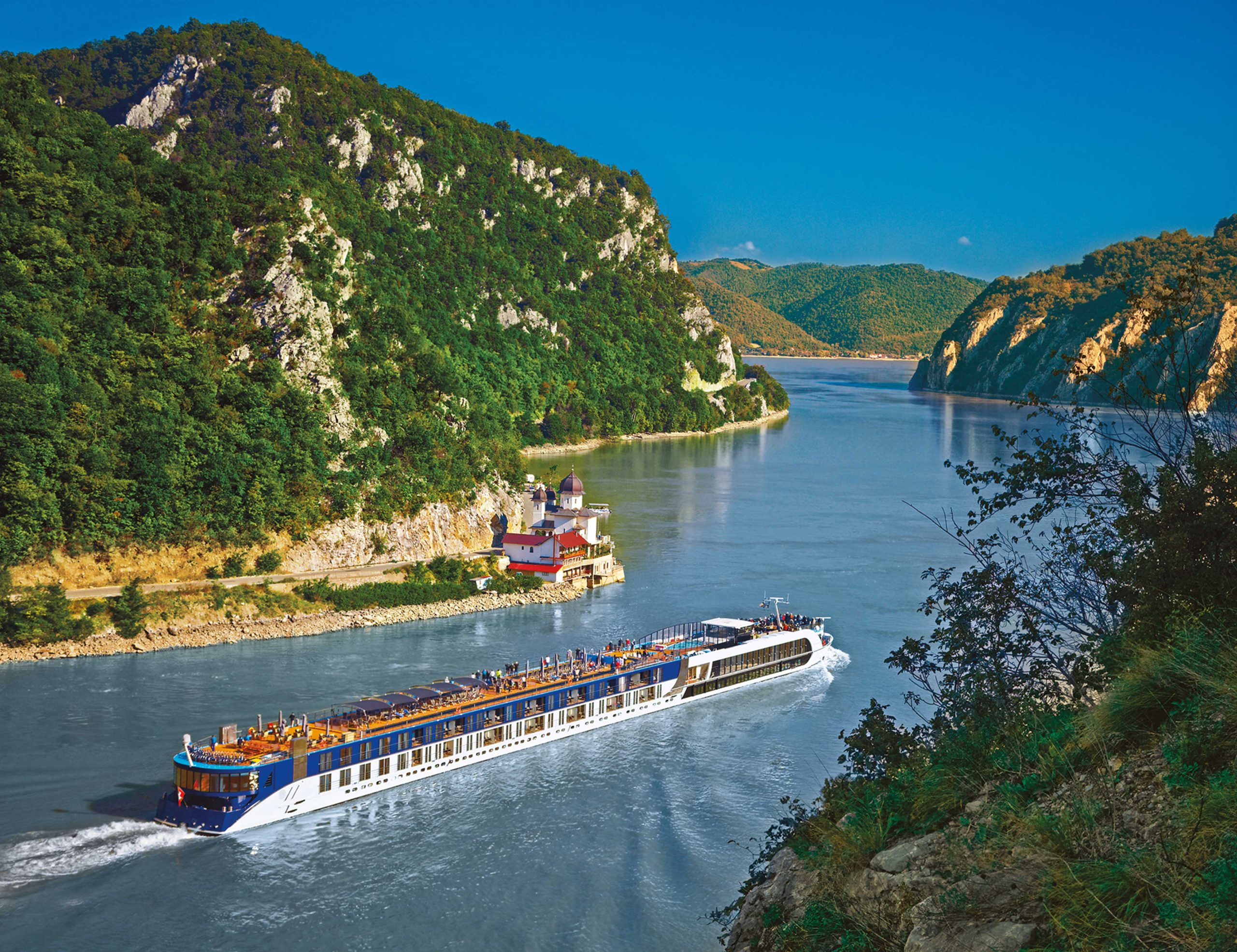
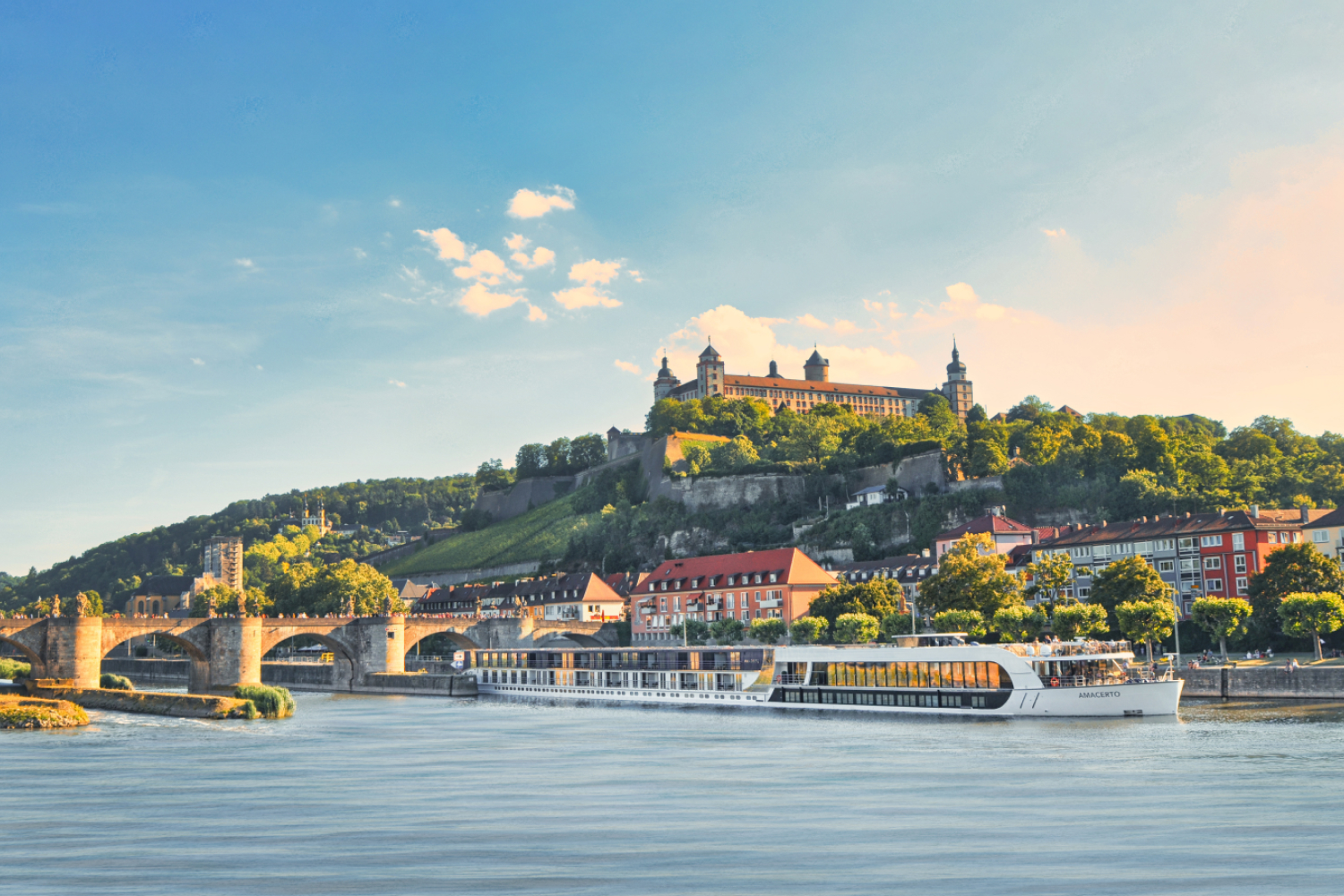
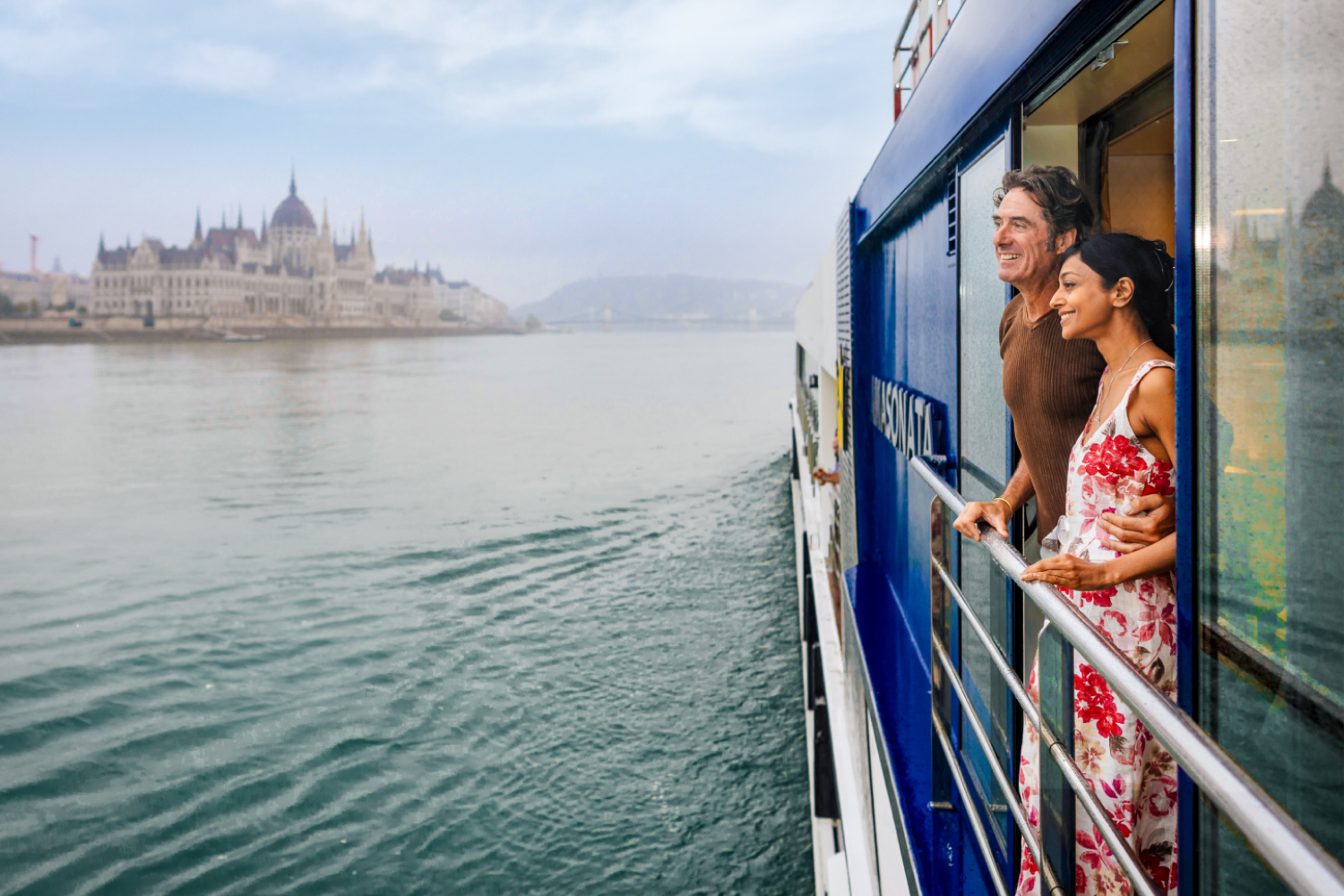
Itinerary
Sometimes referred to as the Mother City, Cape Town is the most famous port in South Africa and is influenced by many different cultures, including Dutch, British and Malay. The port was founded in 1652 by Dutch explorer Jan Van Riebeeck, and evidence of Dutch colonial rule remains throughout the region. The port is located on one of the world’s most important trade routes, and is mainly a container port and handler of fresh fruit. Fishing is another vital industry, with large Asian fishing fleets using Cape Town as a logistical repair base for much of the year. The region is famous for its natural beauty, with the imposing Table Mountain and Lions Head, as well as the many nature reserves and botanical gardens such as Kirstenbosch which boasts an extensive range of indigenous plant life, including proteas and ferns. Cape Town’s weather is mercurial, and can change from beautiful sunshine to dramatic thunderstorms within a short period. A local adage is that in Cape Town you can experience four seasons in one day.
Day programme:
ARRIVE IN CAPE TOWN, SOUTH AFRICA. Situated amidst majestic mountains and lined withpristine beaches, Cape Town has a rich cultural heritage with extraordinary attractions. After being greeted at theairport by an AmaWaterways representative, transfer to your historic hotel with its lush gardens and Table Mountainas a backdrop. Get to know your tour director and fellow travelers at a special Welcome Reception. (WR)
Sometimes referred to as the Mother City, Cape Town is the most famous port in South Africa and is influenced by many different cultures, including Dutch, British and Malay. The port was founded in 1652 by Dutch explorer Jan Van Riebeeck, and evidence of Dutch colonial rule remains throughout the region. The port is located on one of the world’s most important trade routes, and is mainly a container port and handler of fresh fruit. Fishing is another vital industry, with large Asian fishing fleets using Cape Town as a logistical repair base for much of the year. The region is famous for its natural beauty, with the imposing Table Mountain and Lions Head, as well as the many nature reserves and botanical gardens such as Kirstenbosch which boasts an extensive range of indigenous plant life, including proteas and ferns. Cape Town’s weather is mercurial, and can change from beautiful sunshine to dramatic thunderstorms within a short period. A local adage is that in Cape Town you can experience four seasons in one day.
Day programme:
CAPE TOWN. Begin the day by taking the cableway up Table Mountain, which offers sweeping views ofthe landscapes below. Afterward, enjoy one of the world’s most stunning drives as you head southeast along theAtlantic seaboard past the 12 Apostles, Hout Bay and Chapman’s Peak. Stop at the Cape of Good Hope and itslighthouse, a historic landmark and crucial waypoint for European explorers after it was first discovered in 1488.After a local lunch, you’ll also visit Boulders Beach, home to thousands of African penguins. Back in Cape Town,the evening may be spent at your leisure. (B,L)
Sometimes referred to as the Mother City, Cape Town is the most famous port in South Africa and is influenced by many different cultures, including Dutch, British and Malay. The port was founded in 1652 by Dutch explorer Jan Van Riebeeck, and evidence of Dutch colonial rule remains throughout the region. The port is located on one of the world’s most important trade routes, and is mainly a container port and handler of fresh fruit. Fishing is another vital industry, with large Asian fishing fleets using Cape Town as a logistical repair base for much of the year. The region is famous for its natural beauty, with the imposing Table Mountain and Lions Head, as well as the many nature reserves and botanical gardens such as Kirstenbosch which boasts an extensive range of indigenous plant life, including proteas and ferns. Cape Town’s weather is mercurial, and can change from beautiful sunshine to dramatic thunderstorms within a short period. A local adage is that in Cape Town you can experience four seasons in one day.
Sometimes referred to as the Mother City, Cape Town is the most famous port in South Africa and is influenced by many different cultures, including Dutch, British and Malay. The port was founded in 1652 by Dutch explorer Jan Van Riebeeck, and evidence of Dutch colonial rule remains throughout the region. The port is located on one of the world’s most important trade routes, and is mainly a container port and handler of fresh fruit. Fishing is another vital industry, with large Asian fishing fleets using Cape Town as a logistical repair base for much of the year. The region is famous for its natural beauty, with the imposing Table Mountain and Lions Head, as well as the many nature reserves and botanical gardens such as Kirstenbosch which boasts an extensive range of indigenous plant life, including proteas and ferns. Cape Town’s weather is mercurial, and can change from beautiful sunshine to dramatic thunderstorms within a short period. A local adage is that in Cape Town you can experience four seasons in one day.
Day programme:
CAPE TOWN. Today, you may visit Robben Island, once used as a prison for many political inmates,including Nelson Mandela. You’ll ferry over to the island, where a warden will lead you through the prison andrecount its tumultuous history. Back in Cape Town, enjoy lunch and visit a nearby township where you’ll have aunique and memorable experience meeting residents involved in the arts (music and theater), market gardens, andother community projects, as well as learning about the day-to-day life of the locals. In the evening, enjoy a specialwine tasting and gourmet dinner at a vineyard in the nearby winegrowing region of the Constantia Valley. (B,L,D)
Sometimes referred to as the Mother City, Cape Town is the most famous port in South Africa and is influenced by many different cultures, including Dutch, British and Malay. The port was founded in 1652 by Dutch explorer Jan Van Riebeeck, and evidence of Dutch colonial rule remains throughout the region. The port is located on one of the world’s most important trade routes, and is mainly a container port and handler of fresh fruit. Fishing is another vital industry, with large Asian fishing fleets using Cape Town as a logistical repair base for much of the year. The region is famous for its natural beauty, with the imposing Table Mountain and Lions Head, as well as the many nature reserves and botanical gardens such as Kirstenbosch which boasts an extensive range of indigenous plant life, including proteas and ferns. Cape Town’s weather is mercurial, and can change from beautiful sunshine to dramatic thunderstorms within a short period. A local adage is that in Cape Town you can experience four seasons in one day.
Day programme:
CAPE TOWN – VICTORIA FALLS, ZIMBABWE – ZAMBEZI QUEEN – EMBARKATION. Inthe morning, transfer to the airport for a flight to Victoria Falls. Here, you will be transferred to the Chobe Riverthat forms the border between Botswana and Namibia. Tender boats will transport you to Zambezi Queen, mooredon the Namibia side of the river. Settle into your stateroom, enjoy a mid-afternoon snack, and in the evening, betreated to a Welcome Cocktail Reception and Dinner. (B,D)
Day programme:
ZAMBEZI QUEEN. Embark on a morning boat safari and experience the Chobe River’s diverse gameviewing. Afterwards, return to Zambezi Queen for lunch. As the ship cruises along the Chobe River, you can spendtime in the splash pool, visit the spa or perhaps catch up with your favorite book. Later in the day, revel in thepanoramic views with another boat safari opportunity. (B,L,D)
Day programme:
ZAMBEZI QUEEN. Start your day off with a boat safari. Later, a local African village invites you toexperience the local culture firsthand. Spend time with the children of the village as well as its elders and learnabout their day-to-day life. After lunch on board, you can choose between a boat safari, bird watching or fishing.Spend your last evening aboard reveling in a festive African-themed dinner hosted by your crew—complete withsinging and dancing. (B,L,D)
Day programme:
ZAMBEZI QUEEN – DISEMBARKATION – VICTORIA FALLS, ZIMBABWE. Disembark andjoin a wildlife safari of Chobe National Park in open-top 4×4 vehicles. Be on the lookout for elephants, giraffes,zebras, sable, warthogs and cape buffaloes. Prides of lions, hyenas and (more rarely) cheetahs may also appearalong the way. For lunch, take a seat under the trees and savor a delicious picnic. Later this afternoon, transfer toVictoria Falls, then enjoy a special dinner with live local entertainment at your hotel. (B,L,D)
Day programme:
VICTORIA FALLS. Join a local guide for a tour of Victoria Falls. Learn about its history as well as theflora and fauna that make this area so unique. In the evening, embark on a private sunset cruise along the ZambeziRiver. Relax on board as you observe a variety of wildlife while enjoying a delicious mix of tapas with drinks. (B)
Day programme:
VICTORIA FALLS. This morning, you are invited on a leisurely guided walk across the Victoria FallsBridge, which connects the countries of Zimbabwe and Zambia. Once in Zambia, explore the more intimate side ofthe Falls and visit the historic town of Livingstone. Later, head back to Zimbabwe for a free afternoon. As a specialtreat tonight, head out on a safari to seek out the elusive Black Rhino and other nocturnal animals, followed by athree-course bush dinner. (B,D)
Day programme:
VICTORIA FALLS – JOHANNESBURG, SOUTH AFRICA. Board your flight to Johannesburg,where you will be met by your AmaWaterways local guide, then transfer to the Fairlawns Boutique Hotel with itsparklike setting and wonderful spa. (B)
Day programme:
JOHANNESBURG. Get an in-depth look at Soweto’s unique neighborhoods, which served as the centerof the uprising against the apartheid state. Walk in the footsteps of Nelson Mandela and visit a youth center andschool in the heart of Kliptown, one of Soweto’s neighborhoods. After a local lunch, tour the Apartheid Museum,which chronicles the history of apartheid in South Africa and the struggle of citizens to end the regime of racialsegregation. Later, return to your hotel and enjoy free time, where you may visit the hotel’s renowned spa or take aswim in the pool. In the evening, you are invited to join a multi-course dinner. (B,L,D)
Day programme:
JOHANNESBURG – KRUGER NATIONAL PARK AREA. Board your flight to Greater KrugerNational Park in the morning, where you’ll be transferred to the five-star Tented Camp. During the afternoon, setout on a game drive in search of the country’s “Big Five” and other native wildlife. Spend your first night and everynight, if you wish, gathering with fellow travelers, sharing stories of the day’s adventures. (B,L,D)
Day programme:
KRUGER NATIONAL PARK AREA. Early morning is the perfect time to go on safari, as thewildlife is prolific. Your open-air vehicle provides the ideal way to explore your private game reserve, located justa stone’s throw from the game-rich Kruger National Park. The rest of each morning and early afternoon can bespent enjoying the facilities and participating in various activities at a luxury tented safari lodge. Later, eachafternoon, you will go on another game drive deep into the bush, where you may encounter South Africa’s toppredators: cheetahs, hyenas and lions. (B,L,D)
Day programme:
KRUGER NATIONAL PARK AREA. Early morning is the perfect time to go on safari, as thewildlife is prolific. Your open-air vehicle provides the ideal way to explore your private game reserve, located justa stone’s throw from the game-rich Kruger National Park. The rest of each morning and early afternoon can bespent enjoying the facilities and participating in various activities at a luxury tented safari lodge. Later, eachafternoon, you will go on another game drive deep into the bush, where you may encounter South Africa’s toppredators: cheetahs, hyenas and lions. (B,L,D)
Day programme:
KRUGER NATIONAL PARK AREA – JOHANNESBURG. Join one last early-morning game drivebefore returning to the lodge for breakfast. Afterwards, transfer to the airport in Johannesburg for your connectingflight home. (B)Note: Please do not schedule your onward flight before 5:00 p.m
Ship features

Luxury Suite
Suite Features
- In-room temperature control and fan
- Spacious en-suite bathrooms
- Large wardrobe, full-length mirror, hair dryer, toiletries, bathrobes and slippers
- Floor-to-ceiling windows, sliding glass doors and sliding shutters for privacy and protection from the sun
- Outside balcony
- Complimentary Wi-Fi and electronic safe
- Complimentary bottled water replenished daily

Category SA
Stateroom Features
- In-room temperature control and fan
- Deluxe hotel-style bedding and oversized king beds (can also be configured as two single beds)
- Spacious en-suite bathrooms
- Large wardrobe, full-length mirror, hair dryer, toiletries, bathrobes and slippers
- Floor-to-ceiling windows, sliding glass doors and sliding shutters for privacy and protection from the sun
- Outside balcony
- Complimentary Wi-Fi and electronic safe
- Complimentary bottled water replenished daily

Category SB
Stateroom features include:
- In-room temperature control and fan
- Deluxe hotel-style bedding and oversized king beds (can also be configured as two single beds)
- Spacious en-suite bathrooms
- Large wardrobe, full-length mirror, hair dryer, toiletries, bathrobes and slippers
- Floor-to-ceiling windows, sliding glass doors and sliding shutters for privacy and protection from the sun
- Outside balcony
- Complimentary Wi-Fi and electronic safe
- Complimentary bottled water replenished daily
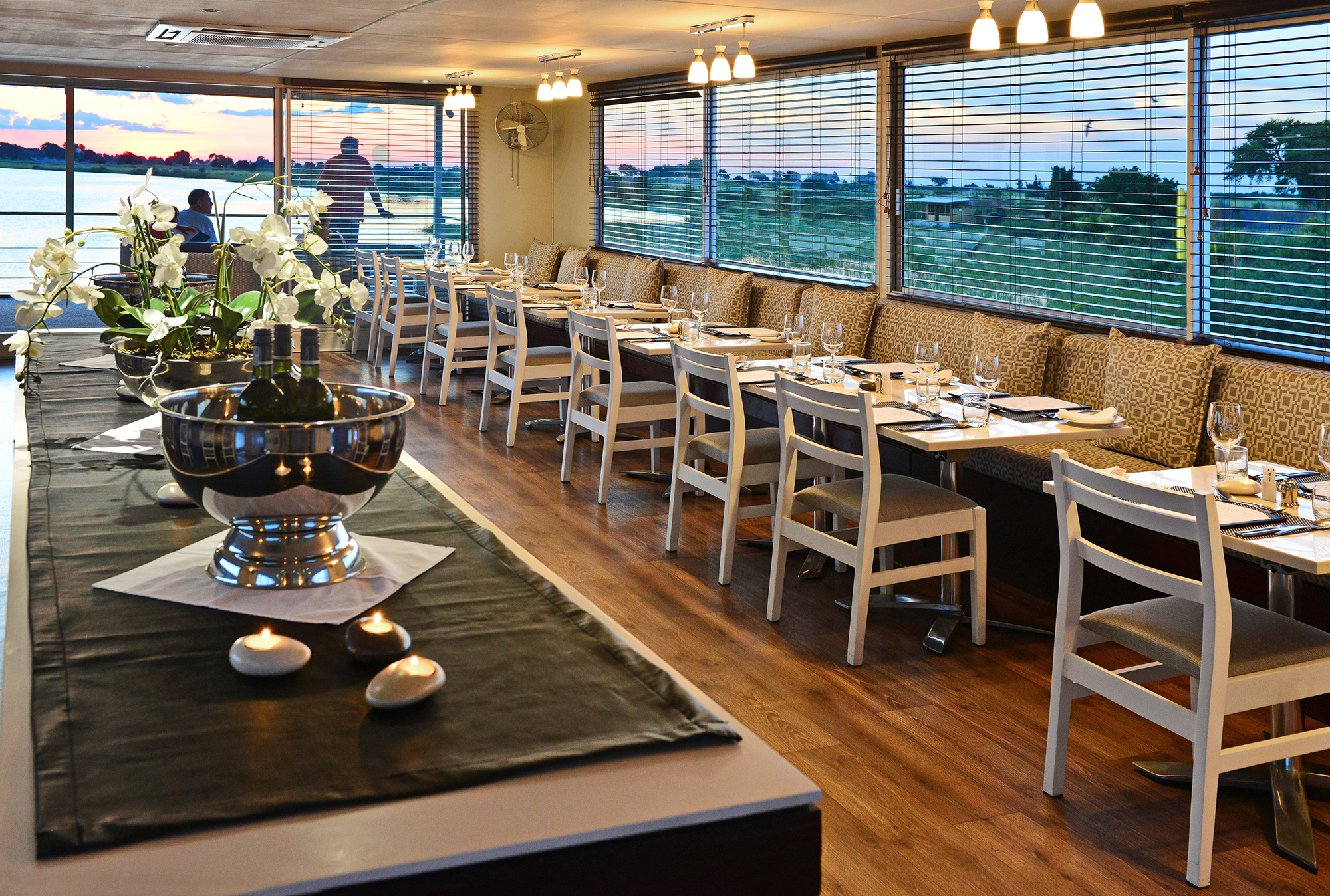
Main Restaurant
Situated on the 3rd level, the dining room offers unobstructed views on three sides. Experience delectable dishes such as butternut and macadamia soup and fillet of beef with bordelaise sauce paired with the perfect wine.
Restaurant Features:
- All meals included during the cruise with complimentary wine and beer
- Enjoy delicious cuisine while observing the surrounding wildlife
Wildlife
The mighty roar of the lion, the powerful call of the elephant, the thunderous clap of a rhinoceros herd – Africa’s incredible national parks are most certainly “where the wild things are.”
Tarangire National Park
Tarangire boasts a variety of wildlife as diverse as its landscape. This picturesque destination is home to all of Tanzania’s most iconic animals, including wildebeest, zebra, gazelle and giraffes.
Lake Manyara National Park
Lake Manyara National Park is one of Africa’s alkaline water lakes, which attracts a vast population of water birds and a wide range of animals. The park is famous for its tree-climbing lions.
Ngorongoro Conservation Area
Often called “Africa’s Eden,” Ngorongoro Crater is the largest intact caldera in the world. An estimated 25,000 large mammals roam through this lush paradise.
Serengeti National Park
The UNESCO-designated Serengeti spans 12,000 square miles and teems with the most magnificent wildlife, offering exciting and unrivaled game-viewing.
Kruger-National-Park
One of Africa’s largest reserves, Kruger stretches through 7,500 square miles in northeastern South Africa, and borders Zimbabwe and Mozambique. With over 270 animal species, there is much to see and experience.
Lodges & Hotels
Experience uninterrupted game viewing in an untouched African wilderness and wake up to the sounds of the wild during your stay at one of two lodges, each designed for an unforgettable adventure.
Tintswalo Safari Lodge
Set amidst ancient sycamore trees and nestled along a seasonal river, this luxurious lodge boasts six classic suites (725 sq. ft.). You’ll find both an indoor and outdoor shower, and the deck features a private plunge pool.
Serengeti Migration Camp
The 20 deluxe and spacious elevated tents at Serengeti Migration Camp feature 360-degree verandah decks, creating your very own private sanctuary. This camp has been named one of the world’s “Top 10 Hotels” by “Travel + Leisure.”
Serengeti Pioneer Camp
This wondrous 5-star camp, modeled after the safari retreats of the 1930s, provides an ideal location in a unique area that takes advantage of the early months of the annual migration. The camp comprises ten individually designed luxury tents, complete with en-suite facilities.
Tarangire Treetops
Live a dream staying high above marula and baobab trees at one of the world’s most distinctive lodges. Each elevated, open-fronted room offers panoramic views across the Tarangire plains and boasts large bedrooms and exotic double showers.
The Manor at Ngorongoro
Each of the 20 Manor Cottage suites at this gracious estate features a private deck and courtyard, indoor and outdoor fireplaces, a Victorian-style claw-footed bath and a rainfall shower.
Authentic Experiences
National Park Safaris
From massive herds of impala to lounging lions, the diversity of this region sets it apart from any other location in the world and allows for exhilarating encounters with the mighty animal kingdom.
Bird Watching and Fishing
Hook a tiger fish, or one of the many bream species. Prefer bird watching? Since the Chobe River is home to more than 450 species, you’ll be able to spot a host of birds.
Gorilla Trekking in Rwanda
Discover Rwanda’s natural wonders and wildlife on an epic adventure with the magnificent Mountain Gorillas, a truly once-in-a-lifetime experience to see the gorillas in the mist.
African Village Visit
During your cruise along the Chobe River, you will visit one of the villages along its banks and meet the wonderful residents there. Many guests wish to give back after visiting the village. If you’d like to coordinate a donation to any African village, please contact us at giveback@amawaterways.com.
Boma Dinner
BOMA (British Officers Mess Area) is a circular-shaped gathering point, normally with a fire pit, where people gather to cook, eat, sing and socialize.
Rovos Rail
When wood-paneled coaches and world-class staff greeted adventurers ready to be whisked off on the safari of their dreams…
Wishing you could harken back to this golden age of African rail safari? Where you could roll through the countryside aboard a locomotive, taking in the impressive wildlife and rugged landscape of Africa? Don’t let this bygone era pass you by! You too can enjoy the romantic and nostalgic atmosphere for yourself as you board a luxurious Rovos Rail vintage train and travel through the heart of some of Africa’s most vividly captivating sights on our Rivers & Rails of Africa itinerary.
The Distinguished Way to Travel
Traveling via train was once the most distinguished way to travel. It was glamorous, chic, and posh. Trains were dazzling works of art and the subjects of Agatha Christie novels. Travelers would dress in their absolute finest and delight in the utter luxury of taking one’s time—after all, life is about more than just the destination.
Since its establishment in 1989, Rovos Rail has earned an international reputation for its truly world-class travel experiences. Five-star cuisine, excellent South African wines, and extraordinary views await our explorers when traveling in turn-of-the twentieth-century style throughout this 995-mile route.
Safari in Luxury
Your trip aboard Rovos Rail will start with a sendoff at the colonial-era rail station in Victoria Falls. From there, wind your way through the timeless beauty of the African bush – where you may spot various herds of wildlife roaming or galloping by. As you travel to your next destination, you can relax in the train’s glamorous lounges, which feature plush seating and picture windows. You will also enjoy your meals in the exquisite Victorian dining room, where crisp linen and polished silver are paired with elegant cuisine and fine wines. Dressing up for dinner is all part of the fun here – with cocktail attire for ladies and jackets and ties for gentlemen.
Watching the World Go By
After your visit to Zimbabwe’s Hwange Game Reserve, you will continue towards the metropolitan city of Pretoria, where you will be met by lush mauve blossoms and Jacaranda trees lining streets – and possibly even a flock of preening peacocks that congregate nearby. Through it all, you’ll be able to watch the world roll by at the pace of a time gone by – but with some modern amenities and considerations, such as air-conditioned suites and lounges. There are no radios or television sets on board to preserve the authenticity of travel at the turn of the century, but travelers may use laptops or mobile devices within the privacy of their own suite.

Sought-After Souvenirs
What will you bring home from your Africa cruise? Below are two guest – and crew – favorites that support local artisans and villages.
Rooibos Tea
For the tea connoisseur, pick up some fresh rooibos tea, “red tea”, that can only grow in the Cederberg region of the Western Cape. It’s well-known for its antioxidant properties and had a mild, earthy flavor.
Zulu Shield
Take a piece of Africa home with you with a traditional Zulu shield (sizes range from small decorative to large life-size). With intricate beadwork, Zulu Shields are beautiful in both color and craftsmanship.

Lounge & Bar
With panoramic floor-to-ceiling windows throughout the boat, everywhere you go you can take advantage of magnificent wildlife viewing.
Bar includes local & imported spirits, wine and beers
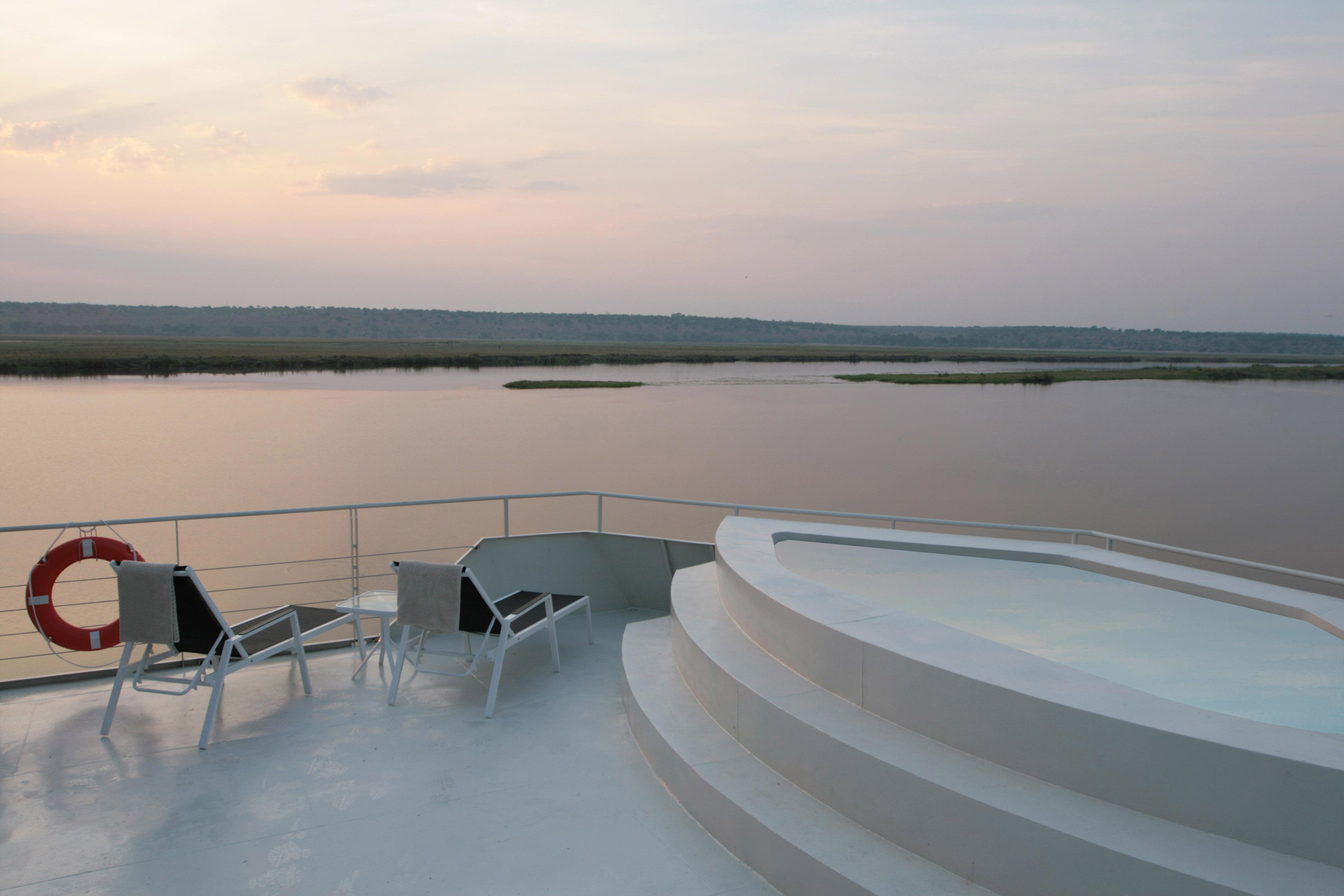
Pool Deck
The top deck features an open-air Sun Deck complete with a plunge pool. Unlike a typical river cruise that travels from one port to the next, the Zambezi Queen was designed for an entirely different purpose—to facilitate optimal game viewing along the Chobe.
Gift Shop
The onboard boutique offers a variety of souvenirs for purchase.
Local Entertainment
One of the most enriching ways to discover Africa is through its spirited dance, as well as its music, which varies throughout the continent. While cruising, be treated to an African-themed dinner, combining the traditional food, music and dance of the Chobe River region.

Plunge Pool
Take a cooling dip and feel refreshed while watching the passing scenery and wildlife upon the Chobe River.
Onboard Spa
Indulge in the ultimate in relaxation by pampering yourself with a variety of massage and facial treatments while cruising the Chobe River, available for a nominal fee.
Age Restriction
All guests under the age of 18 are to be in a stateroom with an adult and must remain supervised at all times; their safety is the responsibility of the accompanying adult(s). In the case where a triple or quad occupancy stateroom is not available or not selected, children under the age of 10 at the time of embarkation may share a stateroom with two adults only in circumstances where the child is able to share the bed with the adults – no additional bed will be provided. Please be aware that balcony staterooms of any kind may be unsafe for minors if left unsupervised. There is a minimum age limit of 4 years old, unless otherwise agreed upon by AmaWaterways.
On our Africa Safaris & Wildlife Cruise program, due to safety precautions, there is a minimum age limit of 12 years old, unless otherwise agreed upon by AmaWaterways.
AmaWaterways does not provide child-specific programs or child-minding facilities. Please reach out to us if you have any further questions regarding our child policy.
Dress Code
Comfortable, layered clothing adaptable to changing weather conditions is always advisable for daytime excursions. For the evening, “Casually elegant” attire is recommend and you may want to pack something a little dressier for the Captain’s night/Farewell Dinner – similar to how one would dress to dine at a 5-star restaurant. Comfortable shoes are recommended for excursions and workout clothing if you plan to take part in any wellness activities, active tours or use the onboard gym. Depending on the time of year, clothing that can be layered is highly recommended.
Smoking Policy
Smoking is forbidden on all internal areas on the Zambezi Queen. Smoking is only permitted on the outside area of the entertainment deck.
Dietary Requirements
Please let us know prior to your departure if you have any special dietary requirements (e.g. vegan, diabetic, gluten-free, etc.). We will make every effort to accommodate your requests, with the resources available to us.
Disabled Facilities
Physical Requirements
AmaWaterways’ itineraries are as varied and active as you want them to be. Shore excursions and land packages require a moderate-to-challenging amount of walking and sites may have steps and/or uneven terrain. The embarkation/disembarkation points between ship and shore may not be able to accommodate guests with mobility issues.
Due to uneven terrain, cobblestones, stairs, temples, dirt roads and a lack of accessible facilities, our itineraries are not recommended for guests with limited mobility requiring the use of mobility aids like wheelchairs, scooters or any other mechanical devices. We kindly request guests requiring special assistance be accompanied by a companion who is physically able to provide such assistance, as AmaWaterways crew is unable to assist guests with personal tasks or hygiene needs. If there is uncertainty of a prospective guest’s fitness to travel or ability to independently care for their personal needs, please inform AmaWaterways as soon as possible. This will allow us to consider and discuss possible accommodations to ensure your safety and comfort during the cruise.
Throughout your river cruise it is likely the ship will be docked next to one or two other river ships. It is important to note that in these cases, disembarkation/embarkation may include walking up the stairs and through the adjacent ship(s) lobby or Sun Deck to reach the shore. You may also need to embark or disembark via a narrow gangway or occasionally cross an uneven surface to enter or exit the ship. These are typical situations that are beyond the control of AmaWaterways.
Accessible Facilities
Due to lack of space and facilities, shipboard accommodations and storage for mobility aids like wheelchairs, scooters or any other mechanical devices are unavailable and accessible facilities are extremely limited in most destinations. In addition, motorcoaches, boats and minibuses used for transfers and shore excursions are not equipped with the devices and tools necessary for full accessibility.
Mobility Devices
Guests may bring personal mobility devices (wheelchairs, electric scooters and walking frames) onboard our ships. However, devices must be stored in the guest’s stateroom and cannot be used in the dining room or lounge and must adhere to local standards and limitations. AmaWaterways Cruise Directors, crew and guides are unable to push wheelchairs on board or on shore.
Transfers and shore excursions adhere to a set schedule and cannot be adjusted for unexpected delays due to physical limitations. AmaWaterways and its affiliates are not responsible for any denial of services by airline carriers, cruise vessels, hotels, motorcoaches, local guides/operators or other independent suppliers.
Medical Facilities
There is no doctor or nurse aboard your cruise. Please consult your physician prior to traveling if you have a medical condition that might pose limitations during your trip. Please advise us at time of the booking if you have any medical conditions requiring special attention during your trip.
Internet and Wi-Fi Access
Free Wi Fi is available but may be limited and sporadic during certain times of the day due to the ships isolated location.
Laundry
Laundry services are available on board for a fee. Price lists are available in your stateroom. Please note that clothes cannot be dry cleaned on board.
Excursions
Africa Cruise & Land Safari: All excursions are included.
What to Pack
Your Essential Africa River Cruise Packing Guide
When traveling through Africa, it is always advised to travel light. On some itineraries, baggage size and weight are strictly limited. The best advice is “if in doubt, leave it out.”
A safari calls for casual, easy-care clothing that includes some long-sleeved items for protection from mosquitoes and the sun. If you plan on dining at a fine restaurant in a city such as Cape Town or Johannesburg, “smart casual” is the norm – no ties for men or evening dresses for women are necessary. For those traveling to South Africa during the winter months (April – September), it is recommended to bring some warm clothes for chilly early morning and late-night temperatures. Dressing in layers is also recommended, as temperatures rise quickly during the day. Please note plastic bags are discouraged in Botswana and banned in Tanzania and may not be brought into the country. However, Ziploc plastic bags are acceptable for carrying toiletries and medication.
Some recommended items to pack:
- Shorts, jeans and/or long cotton pants (preferably beige or other light color)
- T-shirts and long-sleeved cotton shirts
- Sweater, sweatshirt or warm wrap
- Cotton/wool socks
- Sturdy tennis shoes/walking shoes
- Bathing suit, cover-up and flip flops (for use at lodge/hotel)
- Small flashlight, binoculars, camera equipment and extra batteries/accessories
- Converter and electrical adapter (220v) with a 3-prong plug, although hotels and the Zambezi Queen have adapters readily available.
- Travel-sized deodorant, toothpaste, face masks and razors
- Prescription medications in their original containers
- Non-prescription products: aspirin, eye drops, antibacterial cream, etc.
- Feminine products and cosmetics
- Sun protection: hat with brim and neck strap, lip balm, sunscreen (SPF 40+)
- Insect repellent, especially for mosquitoes, hand sanitizer and disinfectant wipes
- Money belt or other secure place to keep passport and cash
- Backpack or ‘fanny pack’ large enough to hold camera, binoculars, etc.
- Photocopies of your passport, credit cards and important documents
- If traveling on Rovos Rail, men must wear a jacket and tie, and women a cocktail dress or pantsuit at dinner each night on the train

Upper Deck
- (1) Dining Room
- (2) Lounge & Bar
- (3) Pool Deck

Main Deck
- Luxury Suites
- Category SA Staterooms
-
Category SB Staterooms

Lower Deck
- (4) Gift Shop & Cruise Manager’s Desk
- (5) Boarding Area
- Luxury Suites
- Category SA Staterooms




